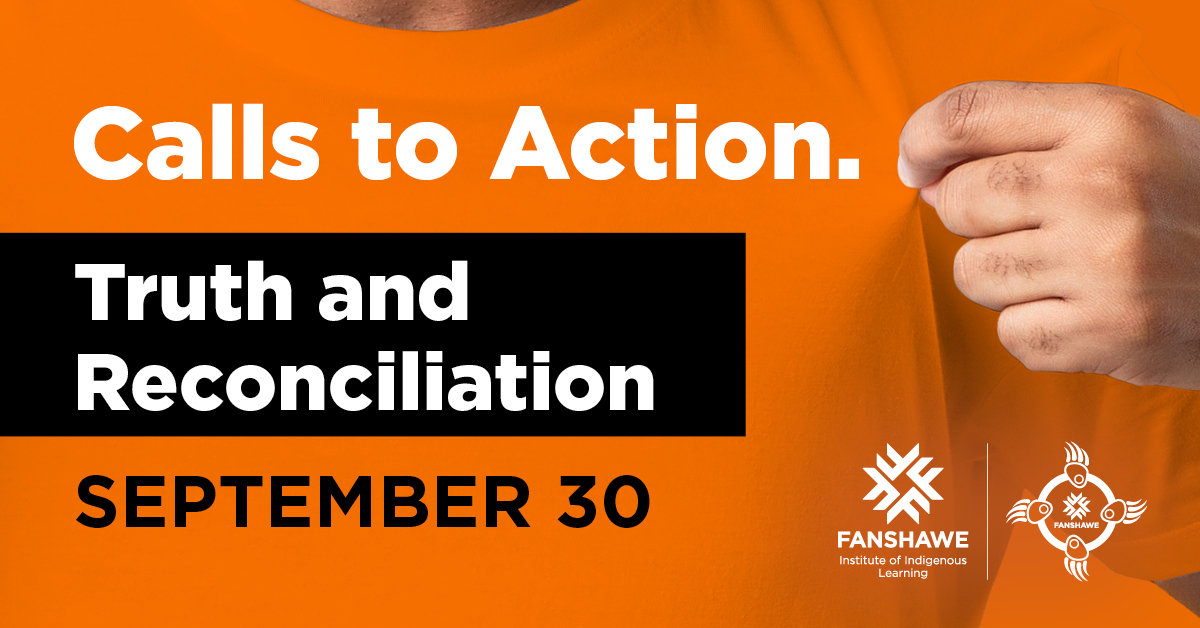Orange Shirt Day commemorates the story of Phyllis Webstad, a Northern Secwepemc author from the Stswecem'c Xgat'tem First Nation, and the creator of Orange Shirt Day. When Phyllis arrived at the residential school in 1973 at six years old, she was wearing a brand-new orange shirt that had been gifted to her from her grandmother. Phyllis was so proud of her new school outfit but recalls feelings of helplessness and loss on her first day of school when her new orange shirt was taken from her with the rest of her belongings. This sense of hopelessness and confusion impacted Phyllis for the remainder of her life. In present day, we hope to open avenues of truthful discussion about residential schools and commemorate over 150,000 residential school children by wearing an Every Child Matters orange shirt on September 30. Phyllis Webstad is a First Nations residential school survivor.
The Institute of Indigenous Learning at Fanshawe is purchasing tickets to send students to the Indigenous Music and Artisan Festival at the Western Fair complex this weekend. In traditional circle trajectory, sales from these tickets will be put back towards the community to salvage the last remaining barn of the Mount Elgin Residential school in Chippewas of the Thames, which is to be turned into a museum. The Institute will also be hosting a community lunch on Friday, and all are welcome to drop in and celebrate community by sharing laughter and food—which is what being Nish is all about. This will take place in the courtyard between A and E buildings from 11:30 a.m. and 2:30 p.m. on Friday, September 29.
Fanshawe College acknowledges and recognizes that we are on the traditional and sacred territory of the Anishinaabek, the Haudenosaunee, the Lenape and the Attawandaron peoples.
We recognize the deep connection and the long-standing relationship between Indigenous peoples as stewards of the land of Southwest Ontario and of London, and the treaties specific to this area: the Two Row Wampum Belt Treaty of the Haudenosaunee Confederacy/Silver Covenant Chain; the Beaver Hunting Grounds of the Haudenosaunee Treaty of 1701; the McKee Treaty of 1790, the London Township Treaty of 1796, the Huron Tract Treaty of 1827; and the Dish with One Spoon Covenant Wampum of the Anishnaabek and Haudenosaunee.
The Truth and Reconciliation Commission’s 94 Calls to Action are meant to acknowledge the horrifying history of the residential school system and create support to ensure we prevent this from happening again. We recognize these are first steps towards a long journey of reconciliation, but with awareness must come action. Fanshawe College encourages all community members to be informed about the traditional lands, Treaties, history and cultures of the Indigenous people local to this region: our friends in the neighbouring communities of the Chippewas of the Thames, Oneida Nation of the Thames and the Munsee-Delaware Nation who continue to thrive with their own unique languages, cultures and ceremonies.
Read more about Phyllis’ story and Orange Shirt Day on the Orange Shirt Day website.
Visit the Fanshawe Campus Store in F1019 to purchase your orange t-shirt with proceeds going directly to the Mohawk Institute in Brantford.
Show your allyship and visit the Institute of Indigenous Learning on Friday, September 29 in A1046 or visit the Institute of Indigenous Learning webpage to learn more about their services and resources, including the Indigenous Action Plan.
Learn more about National Day for Truth and Reconciliation and ways you can be an active supporter on the Government of Canada website.
For any media inquiries, please reach out to mediainquiries@fanshawec.ca
Recent News
-
February 19, 2026
Registration open for summer PTS courses and badges
Read StorySummer 2026 part-time studies Registration for courses and badges is now open! Ready to level up... -
February 17, 2026
Dell Tech Days 2026 sale for students
Read StoryUpgrade and save with exclusive student offers This is the perfect time to upgrade your tech... -
February 13, 2026
Office of the Registrar renovations – February 2026
Read StoryOffice of the Registrar: The Office of the Registrar will undergo construction to the front lobby...
Recent News
-
May 8, 2025
Construction Delays
Read StoryDue to ongoing construction in the area, there may be delays in reaching our clinic. We kindly ask... -
April 15, 2025
New Spring Schedule
Read StoryWe’re excited to announce that the spring schedule is now available on our website as we transition... -
December 16, 2024
2025 Pricing Adjustment
Read StoryEffective January 1st, our fees will increase to $30 per treatment. We understand that this is a...

